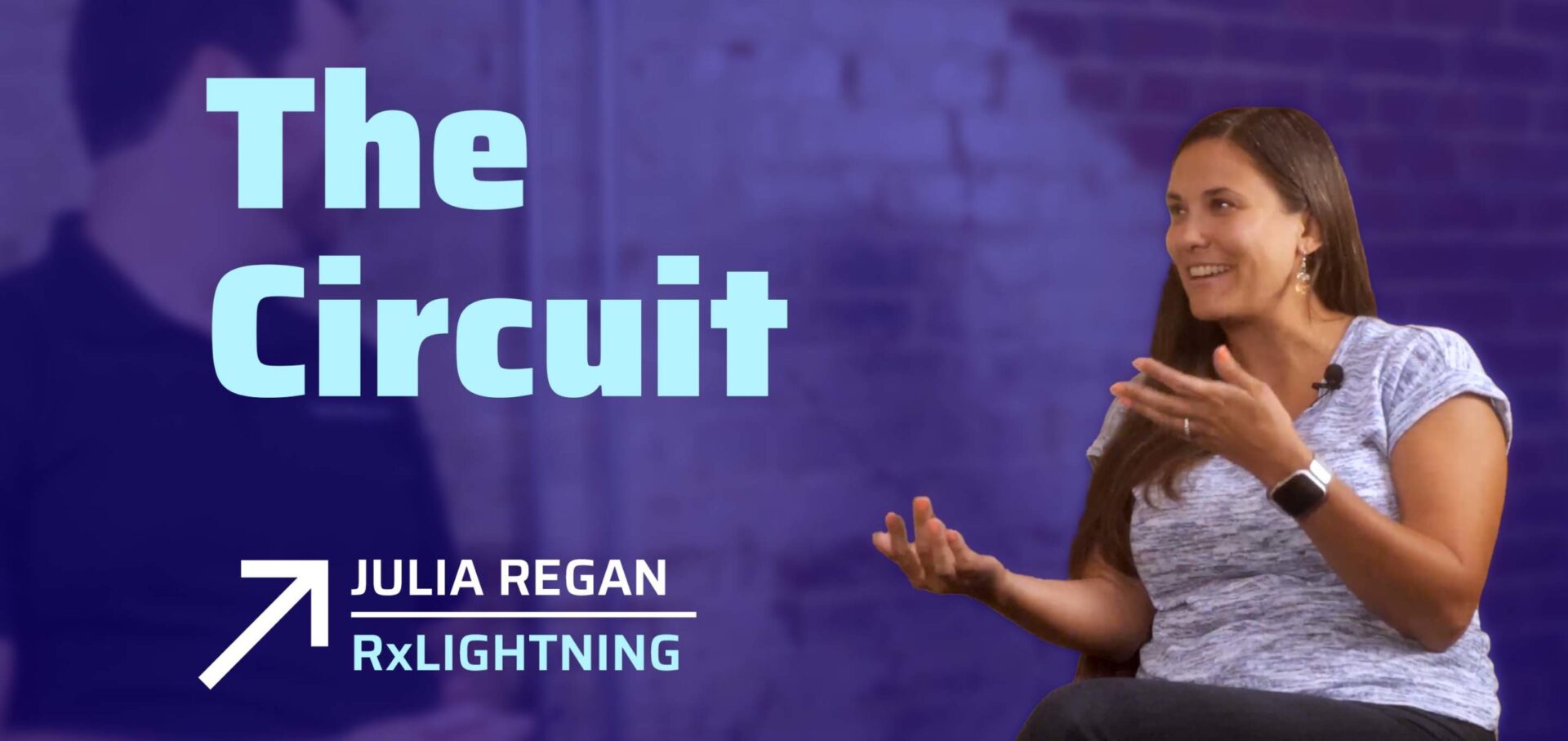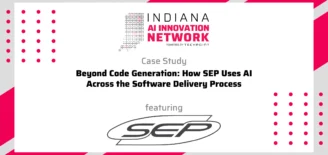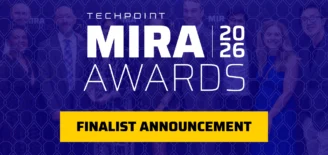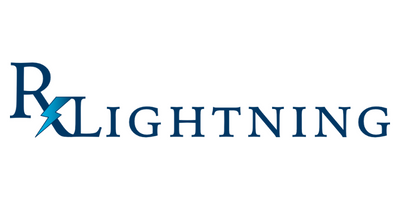Julia Regan | RxLightning: Specialty Drug Enrollment at Lightning Speed
We talk to Julia Regan, CEO and founder of RxLightning. RxLightning is disrupting the healthcare industry by accelerating the enrollment process for specialty prescriptions. In this episode, we will talk about Julia’s motivation behind founding RxLightning, the opportunity they found in specialty enrollment, and her journey to becoming a tech leader.
Jordan Isaacs
Julia, it is so great to be down here in Southern Indiana today in historic New Albany, in your neck of the woods to talk to you today about RxLightning and the work you’re doing. Thank you for hosting us down here.
Julia Regan
Yeah. Thanks for coming.
“RxLightning: Specialty Drug Enrollment to Love”
Jordan Isaacs
Well, let’s get started. Let’s kick-off. so first off for those folks not familiar with RxLightning, what are you and what do you guys do?
Julia Regan
Yeah, so RxLightning’s a two-year-old startup, that has taken a ton of manual processes, to get patients started on specialty medication. So if you think about people that are diagnosed with, cancer, after the diagnosis, there’s a ton of paperwork to get the patient started on therapy, and unfortunately it takes weeks or months and we’ve automated those processes and created an end-to-end platform that’s free to doctors to use. And, when providers use our platform, we’re seeing patients get on therapy in anywhere from days, potentially even hours versus the weeks that it used to take before.
Jordan Isaacs
Wow. So it is that much of a change if we’re comparing and contrasting an organization that doesn’t use RxLightning to one that does, I mean, it is a lot quicker.
Julia Regan
Yeah. It’s quicker for the patients. It’s quicker for the office staff. Unfortunately there’s just so much paper and phone calls and faxes and, with that missing information and process that falls through and as a result, the patient gets impacted. sometimes patient signatures are needed to consent in because these medications you can’t get, at your local retail pharmacy. And sometimes just getting that patient signature, especially in a COVID world takes weeks in of itself. Yeah. Our technology, when providers use it, it takes, you know, 10 minutes, not only to complete the paperwork, but also get the patient’s signature, digitally in a very HIPAA compliant way. And, because of that, everything’s just expedited for the patients in the provider’s office.
Jordan Isaacs
So you started RxLightning just about two and a half years ago now. So, can you talk about what was going on in the industry, that, it made, made you make the decision was the time and the motivation behind starting RxLightning at that time?
Julia Regan
Yeah. There’s when you look at the health tech industry, there’s been a couple other, platform functionalities that have come to market over the last 10 years that, really set it up where RxLightning could tackle the specialty journey for patients. So price transparency is one of them. So like think when a doctor prescribes you a medicine, you go to the pharmacy and pick it up and you usually have no clue what it costs. Yeah. Well, so there’s a price transparency product that is now digital. electronic, prior authorization has happened where that’s the approvals that the insurance company needs to provide. So in the market, you had all of these, parts of the process being created in a digital way. Our explaining took other parts that were still manual, made them digital and then plugged in all these other pieces of the functionality into that platform to really set up providers to tackle this issue. so it, it was a really great timing. For us, with some of the evolution of what has been happening in the industry.
Jordan Isaacs
So you spotted that issue from your past work. You saw, it was such a problem just to get medications, especially medications to patients and you capitalized on it at that point.
Julia Regan
Yeah. Fortunately for myself and my co-founder Brad Allen, we’ve built out some of those products with leading payers and PBMs in the industry and have taken them to, different pharmacies and specialty drug manufacturers. And so for me, it just kind of was a natural evolution. and I had a great support system around me that basically said, Julia, why don’t you try to start a company? If you fail, what’s the worst thing that could happen and go get another job. So, yeah.
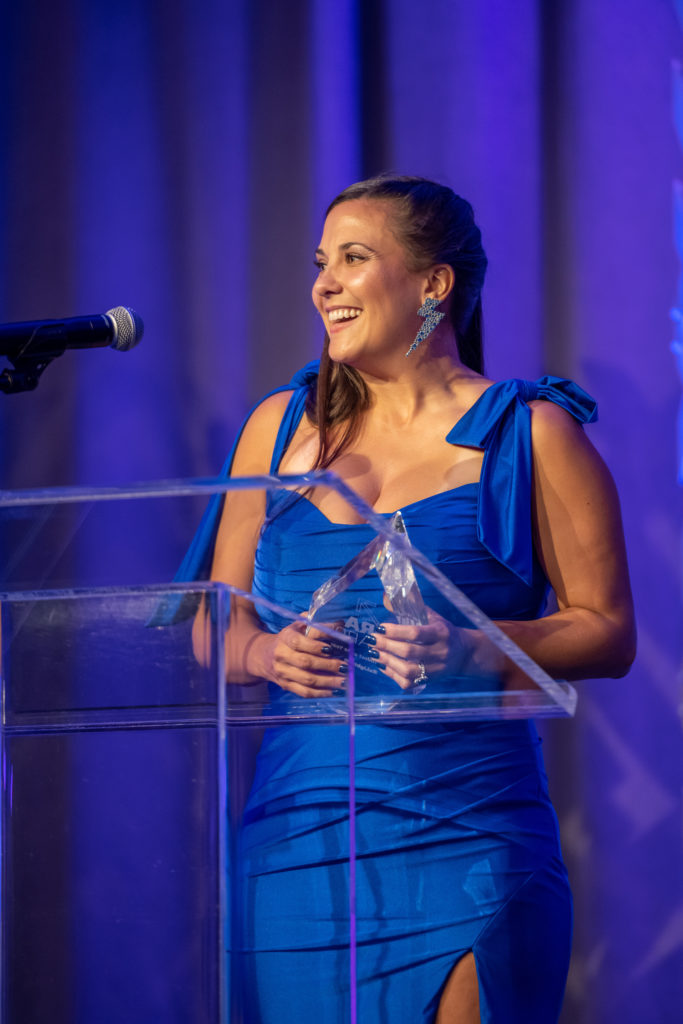
From Pennsylvania to New Albany, Indiana.
Jordan Isaacs
That’s awesome. That’s amazing. So something I’m gonna dig into a little bit later, but I’m gonna ask just right now, you’ve been based in a variety of locations throughout the country. Lived in the east coast. You went to school in the south. You’re in New Albany now, why New Albany? Why Southern Indiana?
Julia Regan
Well, I guess the simple answer is my husband’s from here. So, you know, but it, it’s a great area. I grew up in, you know, country of Pennsylvania. Okay. Outside of Wilke-Barre/Scranton. And, it’s a very similar feel. Yeah. we were close to New York city here and we’re close to Louisville, Kentucky. So we still have the best of what a city has to offer as well as being able to be in the country and have be a little bit away from the hustle and bustle and be able to raise a family. So yeah, just was natural that we were here because of where I lived. Yeah. But when you look at the industry in healthcare, you also have some major, healthcare giants here, you got Humana, which everybody knows, in Louisville, you’ve got one of the largest pharmacies from Optum, which is United Healthcare over in Jeffersonville. You’ve got RxCrossroads, which is part, CoverMyMeds part of McKesson. and you know, I could go on and on about the rest of the healthcare ecosystem here.
Jordan Isaacs
Right. Really see it’s a, it’s a marrying of obviously your husband being from here, but also very much, like where you grew up and you have the ability to spend time in more of a rural area, but attached to that city where, the industry you’re in is alive and well both throughout, this Louisville Kentucky market, but also up in Indiana as well. Yeah, that’s awesome. so since founding RxLightning, the company has raised just about 3 million, and keep me honest there, you’ve won a string of awards as well. So the Vogt Awards 2022 Startup of the Year, you’ve been acknowledged as,2021 Enterprising Women Award and most recently two Mira Awards Tech Product of the Year and Startup of the Year, just, a little over a month ago in Indianapolis, what do you attribute all this inertia around your company to over the last two and a half years?
Julia Regan
Yeah. You know, it’s been an honor to win all of, all of the awards and, it, it’s great to see the recognition from the community surrounding us. I think a lot has to do with just our mission. We are really about helping people and patients solve a major problem, that exist, who can’t get behind helping people when they need medicines, getting them quicker. And when you think about the why, why do we let administrative processes create barriers for patients? With the impact from a patient perspective is I’m sitting here with a disease that could potentially be fatal because these aren’t just a common cold. And, I’m sitting here as a patient with these diseases and every day that I’m going without treatment, it’s the thought about how it’s gonna impact my life, how it’s gonna impact my family and with that, everybody is surrounded by trying to solve it. Yeah. and I think that it’s easy for people to get behind us and see the impact that we could have on the industry and people most, most importantly.
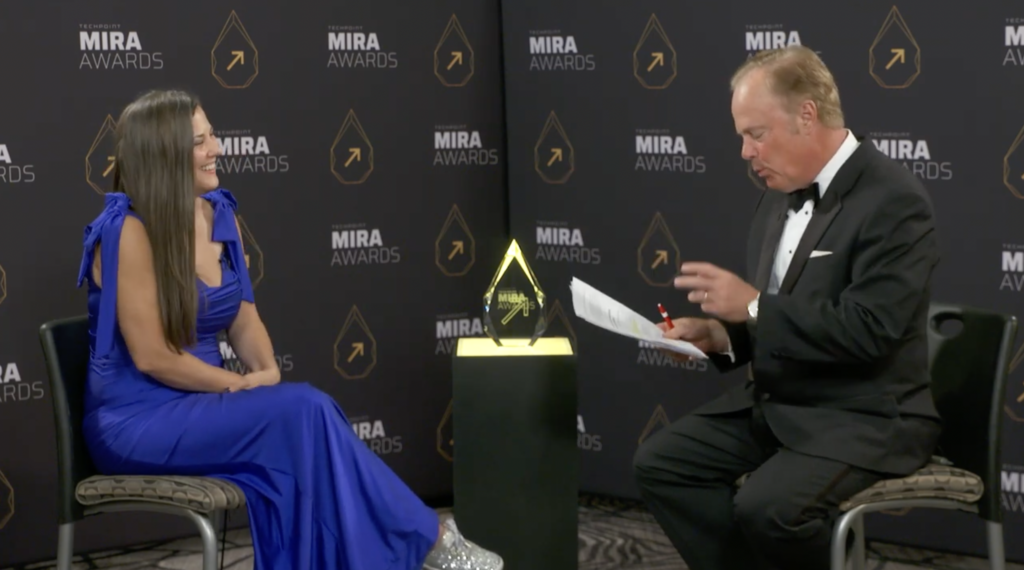
Neuroscience Graduate to Startup Founder.
Jordan Isaacs
Yeah. We’ll come back to the company’s growth here in a bit, but I want to talk about your personal journey leading up to RxLightning. You’ve been in the healthcare space. You obviously geographically live around where there’s a large healthcare presence. You originally studied psychology and neuroscience at Temple in Philadelphia. did you always intend to work in healthcare? Was that your goal?
Julia Regan
Uh, no. No. I thought I’d probably go to grad school and go get a PhD in psych neuroscience, something around that. I realized that that wasn’t probably my journey after I got roles in sales and really fell in love with business. It just happened to be in pharmaceutical sales. So I was with Novo Nordisk at the time. And, my career just, it’s interesting, I look back, it just spiraled in a very positive, lucky way. I sometimes feel like I was in the right time in the right place. If you ever think about that, like when I, I was doing a rotation thinking I’d move up in the sales arm of pharma. And I went in house at Novo and was asked to evaluate e-prescribing any EHRs. At that point in time, they were, they were really not used much. There was a ton of government incentives.
Julia Regan
I didn’t even know what an EHR was. I remember looking at my director saying, could you help give me some more information? And he was like, you’re smart. Go figure it out. And I fell in love with the space. And then ever from that, ever since that moment, it was just a lot about healthcare was so behind the ages. Yeah. Because it was in its infancy with technology because of all the rules and regulations around, HIPAA and patient data and the sensitivity around that. So, there’s just tons of opportunities to create new technologies. And I did a lot of that along the journey and then it was just decided to start the company. So just kind of led me that way.
Jordan Isaacs
So you were really able to hit that spot before EHR were widely adopted and technology. What, 2010 to 2014, when it really became adopted, you were in that area, developed an expertise and that has essentially built on where you’re at today.
Julia Regan
Yeah, yeah, exactly. So I think right around that time and there’s, it it’s been a great journey. you know, but I had no tech, no tech skills at all. And, now, now I still don’t probably have tech skills, but I have the capability to see, see a problem and envision what we could do differently. And, then I go to the people that do the real work, which is my co-founder and my brilliant engineering team. And they figure out how to, how to make all of my, kind of guesses and what I’d like to do happen. So, yeah.
Jordan Isaacs
After Novo, you went to smaller companies, both DrFirst and ReMy Health. what are some of the lessons you learned working, at those companies that have helped laid the groundwork for what you’re doing now? You alluded to it a little bit with the work you’re doing at Novo. You saw some things in you that maybe I’m gonna do some more sales in marketing you learned along the way, but take me through that next journey.
Julia Regan
Yeah. I think a lot of it is just, there’s so much opportunity in healthcare and, if you have an idea that it’s, it’s probably something that hasn’t been done because it’s a little bit antiquated with the technology. And, you know, I’ve been very fortunate to be surrounded where I had growth. So it was innovating products then leading to managing teams, that innovative products, then it led to managing the PNL and having the sales team. And yeah, I got to the point in my career that I had all of the components of what at a very minor level of thinking back on it, but I had all the components of what you need to be able to do to start a business. Yeah. And, I look back and where I was two years ago, I kind of chuckled cause I don’t think I really do anything, compared to what I know now. And it’s just a ever evolving kind of role and you know, every day it’s something new and challenging and growth happens. For, for me as well as the team. So we’re learning together.
Jordan Isaacs
So you learned a lot, both in those kind of the smaller companies you worked for just being able to lead teams, develop product, take it to market. That was, that was really, it sounds like a training grant for what you’re doing now.
Julia Regan
Yeah, exactly. There’s just so much opportunity. Like I, there’s the big companies and the small companies, there’s a lot of opportunities in all of it. My experience with some of the smaller companies is that you’re able to navigate quicker because, you’ll learn something and then you’ll get more responsibilities, more responsibilities. Whereas in the larger companies, you’re just usually bound by corporate hierarchy and process and time. and fortunately for me, I didn’t have that because I went into some of the smaller organizations and was surrounded by some great leaders and other CEOs that have still friends and mentors to me today.
Jordan Isaacs
Being able to solve problems and see opportunity, it sounds like, and be being able to work, on the fly and, and solve those issues as they come up and arise and tackle ’em
Julia Regan
Right.
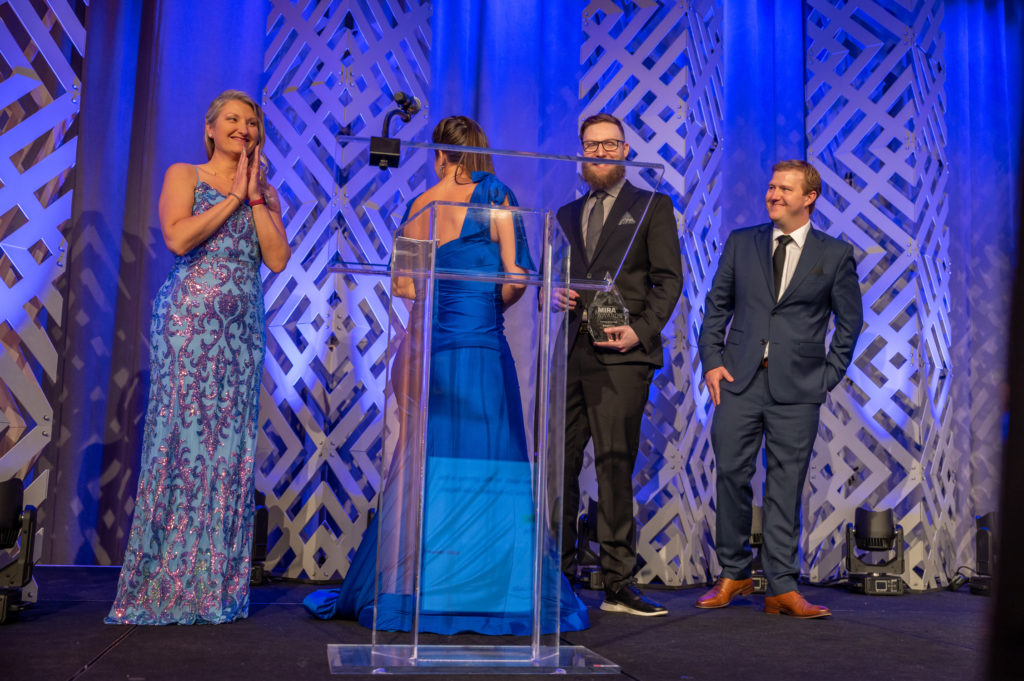
HealthTech’s Role in Front of Office.
Jordan Isaacs
So something I see as a theme in healthtech that might surprise some of those outside of the space, whether it’s RxLightning or Greenlight Guru or Vyne Dental in Indianapolis, or other healthtech companies that are in the state and throughout the United States that TechPoint has worked with many are focused on solving those administrative headaches and less of those like point-of-care solutions for actual patients. Why is that the opportunity versus a solution that may be point-of-care focused?
Julia Regan
Um, so I think, I think the opportunity from the administrative perspective is just healthcare is really in its, in infancy from a technology perspective. So because of that, the fax machine is still used <laugh> and you’re laughing because could you imagine doing your banking with fax machines?
Jordan Isaacs
I have no idea when the last time I used a fax machine.
Julia Regan
Yeah. So, fax machines are major part of healthcare provider’s lives. And if you think about that, it’s not only do you have some digital fax machines, but you still, that means you’re transferring paper. And, a lot of the paper’s handwritten and just because it’s quicker and there’s not the technology there to use it and what we’ve seen or at least we’ve experienced at our explaining is that these antiquated processes really impact the provider’s offices. they’re not efficient things get lost, so you have to do things over and over again. And we, we have providers, groups that have told us that they used to work, you know, 20 hours a day, even though they don’t really have 20 hours in a day trying to complete everything. They never had their queue done. And it had a very, dramatic effect on their personal life because of the stress that involved because at the other end of it, they knew that the patients were suffering, waiting for them to complete stuff. So I think there’s a lot of opportunities, not just in the specialty medication journey, but in, in healthcare, in general, to create technology that helps with the inefficiencies that exist. and that’s why you’re seeing a lot of organizations fall into these administrative, solutions.
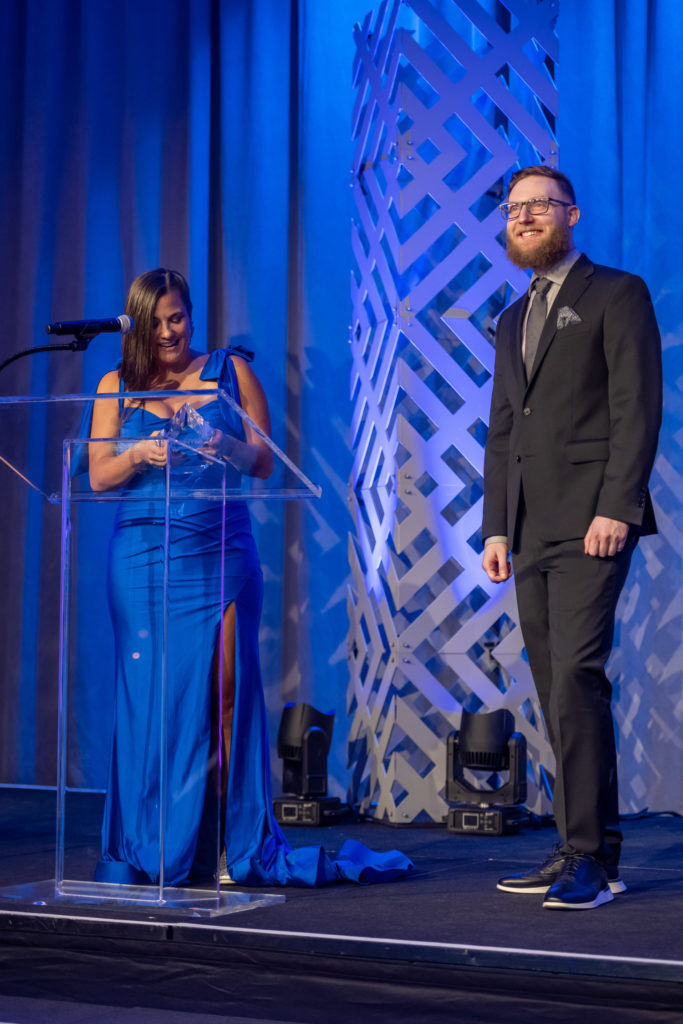
“Specialty Medications at RxLightning Speed”
Jordan Isaacs
You kind of mentioned two things. There, one, there is a larger piece where you’re able to get drugs to patients faster that need ’em, that are suffering from some horrible, horrible issue. but also that administrative side where you’re able to bring time back into people’s day, maybe to mentor staff, maybe to work with other patients, to get that back, logged down any specific, like examples you wanna provide there or any customer story that really sticks out to you and just it’s that why that’s like, I gotta keep working because yeah, I know this person needs it.
Julia Regan
So there’s a woman who has spoken for us before. And, she’s actually with a very large oncology clinic, in Arkansas and most offices when they hear about our solution are a little skeptical, because there’s been other technology solutions trying to solve the problem, but they haven’t necessarily solved it. You know, we’re not… RxLightning isn’t the first concept. We’re the first that’s agnostic and comprehensive and could support a lot of meds, but there’s provider platforms that are very specific to a pharmacy or a drug. But they don’t get a lot of adoption. So we, when we’ve talked to this one individual, she was very skeptical, but was in such a need for a better solution for her cancer patients. That she was willing to try the platform and her experience prior to RxLightning, she said, I’m gonna use it for one of the pharmacies that gives me the biggest headache.
Julia Regan
And honestly, every pharmacy out there gives a provider a headache. Because there’s different workflows and it depends on the provider than what they like. But yeah, for her, the pharmacy that took the longest time, it was about 12 to 15 days.
Jordan Isaacs
Wow.
Julia Regan
On average, but four, her patients would receive shipment confirmation. So she’s like, I’m gonna try two patients and we’ll test it out. Julia, we’ll see how RxLightning solves this problem. And she said that the next… she used RxLightning, submitted all the pape, the next day, her patient who is suffering from cancer, called her and said, my shipment’s confirmed. And she was like, what are you talking about? Like, no way. There’s no way that could ever be possible. But the patient on day two confirmed shipment, the patient on day three was able to start treatment because of our technology. wow.
Jordan Isaacs
So beforehand it was like 15 days just to get confirmation. They were actually gonna send the drugs to the people and to the patient. And now three days later you have, the actual prescriptions in hand, the patient is on those regimens and going through the appropriate treatment.
Julia Regan
Yeah. And when she spoke there’s there’s video of her talking about this, she said for her, it was the moment that she was able to know that her patient was going to be able to start treatment because of the emotional toll that it just removed for that person to now feel like they were actually trying to do something about the disease that they had. And like the, the smile that she has around, what it’s done for her and her patients is great. And she’s like, we have so many stories about this. Like we have another organization who told us that, patient assistance… so not only is it getting the paperwork done, but when you, we’re talking about expensive medications… we’re talking about thousands of dollars a month, they could be tens of thousands of dollars a month. And for the normal American, even the well off Americans, that’s a lot of money. So affordability becomes an issue as well.
Julia Regan
So there’s a lot of programs, whether it’s, based upon the manufacturers that have created free drug programs or there’s foundations out there all take paperwork, always need the patient involved. And these are, what we’ve seen is something that used to take weeks again. Because they, the doctor would fill it out and then mail it to the patient and then the patient would have to mail it back to the doctor. So the doctor could go then fax it to the program. Yeah. All of that used to take weeks and we’re seeing everything be completed in like less than 10 minutes. And then getting the approvals within 24, 48 hours,
Jordan Isaacs
Less than 10 minutes. I can’t imagine being the patient on that end, having family members. I think many people have probably everyone has had family members with some sort of cancer or some kind of really nasty disease and just so much, you know, it can be hard to get that first appointment and then going through that process. And the last thing you want is for this… another hangup. So that’s amazing. That’s gotta be something that just motivates you and your team every day. Like that is the why.
Julia Regan
Yeah. That is the why it’s, you know, we’ve surrounded ourself for around the notion that it is unacceptable as a country for us to create barriers and processes and be okay that people have to wait. And, you know, there’s some instances where they might have to wait a little bit, but if we could improve anything for that patient, it it’s a dramatic impact. And we, we, as an organization, look at making impact in three ways, it’s making an impact on the patient and the provider, making an impact on the industry and then impacting our community just by creating jobs that would’ve been there and doing something that we love to do and be able to be rewarded about the work and the accomplishment that we’ve done together as a team.
Jordan Isaacs
That’s… I love that, that, you’re having an impact on all three of those areas.
Julia Regan
I hope so. <laugh>
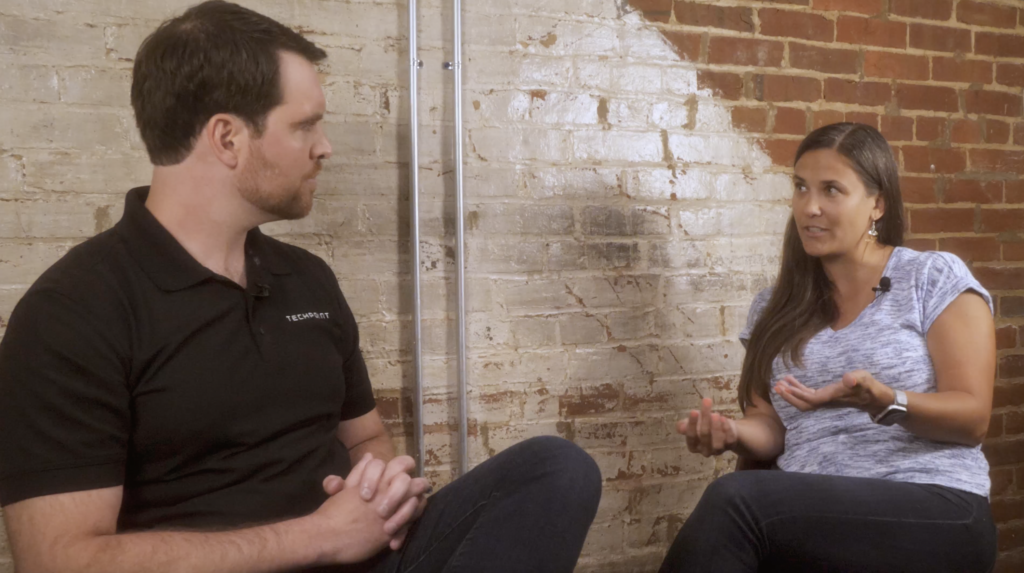
RxLightning’s Growth and Future.
Jordan Isaacs
This leads me to my next question. So back in April at Mira, when you took home two Mira awards. You talked about your growth, including plans to potentially double in size next year of headcount and continue to grow the team. As you look to the future of RxLightning, where do you see the company growing?
Julia Regan
You know, hopefully we grow into an organization that’s having impact on a national scale and, a team that is, responding to, to that scale and impact. Today we’ve grown just since the Mira awards, I think by almost 50%. And we, we don’t expect the growth to, slow down. we’re really looking for talented people that are passionate and share our mission around helping people in the industry and, really looking to connect with more providers and more users and have that impact on more and more people on a day- to-day basis.
Jordan Isaacs
Julia, thank you so much for being on The Circuit today. We at TechPoint are so excited for your future here in Indiana and RxLightning’s future here in Indiana. You are having such an impact in your organization is not only on patients, but, the folks that are doing the work behind the scenes to get drugs and, prescriptions to patients quicker, as well as the work you’re doing here in the community. We’re excited to see you grow.
Julia Regan
Yeah. We’re excited to grow and thank you for all the continued support.
Jordan Isaacs
Thanks for being on The Circuit.

